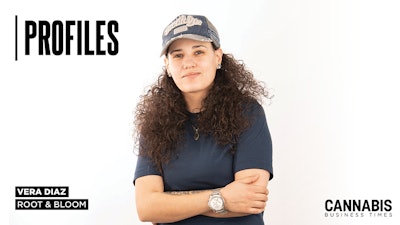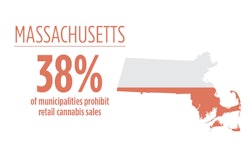
Before Vera Diaz began her cannabis cultivation career at Root & Bloom, she had trouble securing jobs. Without a high school diploma, her opportunities were limited, and people would cancel interviews when they discovered she lacked the credential.
She grew up in Brooklyn, N.Y., and had a tough start, moving in and out of the foster care system. There was little consistency—every month, it seemed, she’d have a new social worker, a new family, a new high school and a new borough to navigate. She had stints in coffee shops and restaurants before moving to Florida, where she met her fiancé, Sam. They decided to make another move to Massachusetts to be closer to Sam’s family.
Diaz wasn’t initially thrilled to leave sunny Florida for Massachusetts.
“The only reason why I agreed to move to Massachusetts was to work in the cannabis industry,” Diaz said.
Diaz had always wanted to work on the plant-touching side—she grew at home and said she has “an infatuation” with cannabis, so much so that she says Sam would have to pull her away from the tent she had set up indoors. She loved being with the plants; they grounded her and rooted her, she said.
But her initial job search experience was discouraging, and she ended up taking a housekeeping job at an inpatient behavioral health hospital. In the meantime, she kept searching online for opportunities, and a custodial position at cannabis cultivation company Root & Bloom, based in Salisbury, popped up in April 2022.
“I applied as a janitor just to get my foot in the door,” she said.
Diaz was called in for an interview in May 2022, and she met with William Windham, the vice president of cultivation and “bombarded him with questions,” she recalled. “I think I interviewed him more than he interviewed me.”
He offered her a job on the spot, and she immediately accepted. She felt it would be a great opportunity to learn more about a plant she loved and be a part of the launch of something new. She was so excited, she said, that she started dancing in the parking lot.
Root & Bloom launched its first flower sales in October 2022, so the company was just getting up and running.
Little did she know that within two years, not only would she be part of the cultivation team, but that she would be helping lead it.
Building the Grow
When Diaz first started, Root & Bloom had not yet harvested its first crop and was just starting to propagate plants in its clone room. There were four people working in cultivation, and the vegetation and flower rooms in the facility, which has a 20,000-square-foot canopy, were empty.
In addition to her primary job responsibilities, she helped build the plant benches and implement fertigation lines, as well as jumped in and offered to help wherever she could—tending to the plants, in the kitchen and with the company’s retail marketing efforts at dispensary popups. She quickly was promoted to a tech, and then elevated again to a salaried Cultivation Supervisor role, leading plant management in the vegetative rooms.
“I fell in love with the veg side of the of the cycle,” she says. “I implemented [a system for] when we do a transplant, the blocks have to be a certain way, the tags have to be a certain way to a point where we can locate any clone in a veg room to the exact spot that it's in. And I’m super proud of that.”
Diaz isn’t the only employee whose tenacity has been rewarded with promotional and educational opportunities, and she believes it’s stories like hers that helped Root & Bloom land the No. 1 spot on Cannabis Business Times Best Cannabis Companies to Work For – Cultivation list.
“Root & Bloom started teaching us how to become a team lead, how to be able to communicate with the employees,” she said. “And a lot of companies, you don't find that at all.”
In addition, the company has enrolled its team of 18 supervisors and executives in continuing leadership education, which is fully paid for, with hourly employees also being compensated for their time spent learning. For 10 weeks each Tuesday, the team takes courses at a nearby community college on management, communication and working with people.
“And I think it's very beneficial, being that we have such a diverse environment in here where it's become easier, even if there's a language barrier. You can tell if someone's upset, even if it’s not communicated; we can communicate without having to talk,” Diaz said. “The first day was very hard for me because it's been over a decade since I've been in school, and the schools I've been to were horrible.”
Diaz said she used to be afraid of schools, where there were threats of violence, and was apprehensive at first. After getting over that initial fear, she said she has learned a lot about how to communicate with other techs, which contributes to the positive culture that has been fostered at Root & Bloom.
“Being able to talk to someone about the mistakes they've made without them feeling like they're being reprimanded. And talking about it more as a learning opportunity and not a combative way, just like, ‘Hey, let's figure this out,’” Diaz said. “We all work great as a team, and we're just comfortable with talking with one another.”
In addition to being discounted for not having formal education credentials, Diaz said in past roles, she faced discrimination. She describes the culture at Root & Bloom as fun and hardworking, but there’s something else that’s been the most meaningful to her.
“It's a beautiful culture. The best thing about Root & Bloom, in my opinion, is in the almost two years that I've been there, I haven't felt discrimination,” she said— she had been reprimanded in the past for speaking Spanish at past jobs. “You don’t have to worry about that. It’s a safe space.”
She described her supervisor who hired her on the spot, William Windham, as a mentor.
“He just has so much knowledge about cannabis, and he dumbs it down for me,” she said, laughing. “I've been here almost two years, and I'm still learning those things, and I love it.”
Although the cultivation facility is busy, she said she has also learned about limits and how far you can push a grow, and a team.
“For instance, we know our limit is 530 plants in the flower room because we know if we let it get past that, we might not be able to trim it up. And we are very big on cleanliness,” she said. “Being one of the first cultivators here … to see, to see these changes happen right before you, especially when it's something you never experienced before, this is all a new journey.”
When asked what advice she’d share with other companies on how to create an environment people love to work in, she said it’s simple: Respect the people and the plants you work with.
“Open communication goes a long way, and just embrace the people you work with,” she said. “We all have our differences, but at the end of the day, the main thing we have in common is that we love what we do. So let's keep doing it.”


























